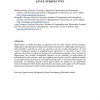Free Online Productivity Tools
i2Speak
i2Symbol
i2OCR
iTex2Img
iWeb2Print
iWeb2Shot
i2Type
iPdf2Split
iPdf2Merge
i2Bopomofo
i2Arabic
i2Style
i2Image
i2PDF
iLatex2Rtf
Sci2ools
BEHAVIOURIT
2010
2010
Individual attitude toward improvisation in information systems development
Improvisation is rapidly becoming an important issue for both scholars and practitioners. Organizations that operate in turbulent environments must learn to swiftly adapt and respond to such instability, especially in areas as innovation and new product development. In such contexts traditional top-down, carefully-planned approaches to innovative projects may represent an obstacle to effectively dealing with environment uncertainty. Prior research on improvisation has focused considerable attention on the centrality of improvisation in individual and group outcomes, while less emphasis has been placed on how individual attitude toward improvisation is formed. In an attempt to fill this gap, we will theoretically analyze the antecedents of individual attitude toward improvisation, by looking at the Information Systems Development (ISD) domain. In particular, the outcome of this paper is the development of theoretical propositions which could be empirically tested in future research.
BEHAVIOURIT 2010 | Improvisation | Individual Attitude | Information Systems Development | Software Engineering |
Related Content
| Added | 28 Feb 2011 |
| Updated | 28 Feb 2011 |
| Type | Journal |
| Year | 2010 |
| Where | BEHAVIOURIT |
| Authors | Massimo Magni, B. Provera, Luigi Proserpio |
Comments (0)

